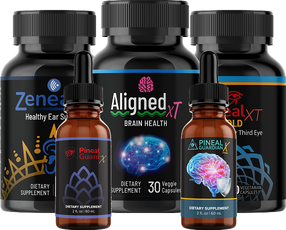Does Iodine Help with Pineal Gland Detox?

The pineal gland, a tiny, pine cone-shaped organ nestled deep in your brain, has fascinated researchers, spiritual practitioners, and health enthusiasts for centuries. Ancient cultures called it the "seat of the soul." Modern science knows it as the master regulator of your sleep-wake cycle, producing melatonin that governs your circadian rhythm.
But there's a growing concern: could fluoride exposure be compromising this vital gland's function? And if so, can iodine help restore it?
Let's examine what clinical research reveals about the relationship between iodine, fluoride, and pineal gland health.
The Fluoride-Pineal Gland Connection
Before we discuss iodine's potential benefits, it's essential to understand why the pineal gland might need "detoxification" in the first place.
Fluoride Accumulates in the Pineal Gland
Scientific studies have shown that the pineal gland accumulates fluoride at concentrations higher than most other soft tissues in the body. This accumulation occurs because the pineal gland lies outside the blood-brain barrier and receives direct blood flow, making it particularly vulnerable to circulating toxins.
Research from the University of Surrey demonstrated that fluoride can bind with calcium in the pineal gland to form calcium phosphate crystals, leading to calcification of the tissue itself.
This matters because fluoride doesn't just pass through. It becomes trapped, potentially compromising the gland's ability to function optimally.
Calcification May Impact Function
Multiple studies have explored the relationship between pineal gland calcification and melatonin production. When the pineal gland becomes calcified, its ability to produce melatonin, your brain's natural regulator of sleep and circadian rhythm, may become compromised.
Research published in peer-reviewed journals suggests associations between pineal calcification and:
- Reduced nocturnal melatonin levels
- Sleep disturbances
- Potential impacts on cognitive function
The Harvard School of Public Health has published research exploring fluoride's effects on neurodevelopment, raising important questions about fluoride exposure and brain health across the lifespan.
How Iodine May Counteract Fluoride
Research suggests that iodine and fluoride have an antagonistic relationship in the body, meaning adequate iodine intake may help protect against fluoride's effects.

The Halogen Competition Theory
Iodine belongs to a chemical family called halogens, which also includes fluoride, chlorine, and bromine. These elements compete for the same receptors in your body, particularly in the thyroid gland.
When your body lacks sufficient iodine, other halogens like fluoride can occupy iodine receptors, a process called "halogen displacement." This is basic chemistry: similar elements compete for the same binding sites.
Adequate iodine intake may help prevent this displacement by ensuring iodine receptors are already occupied by iodine rather than fluoride.
Iodine and Fluoride Excretion
Studies examining the relationship between iodine intake and fluoride excretion have found that individuals with adequate iodine status showed increased urinary fluoride excretion compared to those with iodine deficiency.
The mechanism appears to work through several pathways:
Competitive inhibition: Iodine competes with fluoride for cellular uptake, potentially reducing fluoride accumulation in tissues including the pineal gland.
Enhanced excretion: Adequate iodine status appears to support the kidneys' natural ability to filter and excrete fluoride through urine.
Thyroid support: Since the thyroid gland is affected by both iodine and fluoride, maintaining optimal iodine levels helps ensure proper thyroid function, which supports overall metabolic health and natural detoxification processes.
What Research Suggests
While direct human studies specifically examining iodine supplementation for pineal gland decalcification are limited, animal studies and mechanistic research provide insight:
Animal research has shown protective effects of iodine supplementation against fluoride-induced neurotoxicity, with iodine-supplemented groups demonstrating better cognitive performance and reduced oxidative stress markers in brain tissue.
Studies examining endocrine function note that adequate iodine appears necessary for optimal hormone production throughout the body, including in the pineal gland, though the exact mechanisms require further investigation.
The Broader Picture: Iodine Deficiency and Brain Health
Understanding iodine's potential role in pineal health requires recognizing how widespread iodine deficiency actually is.
The Iodine Deficiency Issue
According to the World Health Organization, iodine deficiency remains one of the most common nutritional deficiencies globally, affecting approximately 2 billion people worldwide.
In the United States, data from national health surveys shows that urinary iodine levels have declined significantly since the 1970s, by more than 50% in some population groups.
This decline coincides with reduced use of iodine-containing compounds in commercial food production and increased consumption of processed foods.
Why Iodine Matters for Overall Health
Iodine is essential for:
Thyroid hormone production: Your thyroid requires iodine to produce hormones that regulate metabolism, energy production, and body temperature.
Brain development: Adequate iodine during pregnancy and early childhood is critical for proper neurological development.
Cognitive function: Even mild iodine deficiency can affect mental clarity and cognitive performance in adults.
Immune support: Iodine has natural antimicrobial properties and supports immune system regulation.
Cellular protection: As an antioxidant, iodine helps neutralize free radicals and reduce oxidative stress throughout the body.
Practical Approaches to Supporting Pineal Health with Iodine
If you're concerned about fluoride exposure and want to support your pineal gland health, here's what makes sense based on current understanding:
1. Optimize Your Iodine Intake
The recommended daily allowance for iodine is:
- 150 micrograms (mcg) for adults
- 220 mcg for pregnant women
- 290 mcg for breastfeeding women
Dietary sources of iodine include:
- Sea vegetables (kelp, nori, wakame): Very high iodine content, though amounts vary

- Fish and seafood (cod, shrimp, tuna): Good sources providing 80-120 mcg per serving
- Dairy products: Moderate iodine from feed and sanitizing solutions
- Eggs: Approximately 24 mcg per egg
- Iodized salt: About 71 mcg per 1/4 teaspoon
However, many people don't consume enough iodine-rich foods regularly, which is where supplementation may be beneficial.
2. Consider Quality Iodine Supplementation
For those looking to support pineal gland health specifically, liquid formulations containing purified iodine alongside complementary nutrients may offer optimal absorption.
Products like Pineal XT Gold blends purified iodine, chlorella, chaga, schisandra, amla, burdock, and turmeric to support pineal function and overall wellness.
Chlorella binds heavy metals for detox, chaga offers antioxidant defense, and schisandra with amla help regulate stress that disrupts melatonin. Burdock aids natural cleansing, while turmeric’s curcuminoids reduce inflammation linked to fluoride damage.
Together, these ingredients help the pineal gland restore melatonin rhythm, enhance cognition, balance hormones, and deepen spiritual awareness, supporting both body and consciousness in one holistic formula.

3. Reduce Fluoride Exposure
Supporting your pineal gland isn't just about what you add. It's also about what you minimize:
Water: Use a reverse osmosis, distillation, or activated alumina filtration system to remove fluoride from drinking water. Standard carbon filters don't remove fluoride effectively.
Toothpaste: Choose fluoride-free toothpaste alternatives if you're concerned about systemic fluoride exposure.
Processed foods: Many processed foods and beverages contain fluoride from fluoridated water used in manufacturing.
Non-stick cookware: Some types of non-stick coatings can release fluoride compounds when heated.
Tea consumption: Tea plants naturally accumulate fluoride from soil. While tea offers many health benefits, you might consider limiting consumption to 2-3 cups daily and choosing younger tea leaves (white or green tea) which typically contain less fluoride.
4. Support Comprehensive Wellness
Pineal health exists within the context of overall wellness. Support your body's natural processes with:
Adequate hydration: Drink plenty of filtered water daily to support kidney function and natural elimination processes.
Antioxidant-rich foods: Berries, leafy greens, cruciferous vegetables, and colorful produce provide compounds that protect against oxidative stress.
Quality sleep: Aim for 7-9 hours nightly in a completely dark room to optimize natural melatonin production.
Stress management: Chronic stress affects multiple body systems. Practices like meditation, breathwork, or yoga support both mental clarity and overall health.
Nutrient-dense diet: Focus on whole foods rich in vitamins and minerals that support natural detoxification pathways.
The Spiritual Dimension: Ancient Wisdom Meets Modern Interest
While we've focused on the scientific perspective, it's worth acknowledging that interest in pineal health often extends beyond physical function into spiritual dimensions.
Many contemplative traditions describe practices aimed at "activating" the third eye or pineal gland, from Kundalini yoga to Tibetan meditation practices.
Modern practitioners often combine these ancient approaches with nutritional strategies, using supplements like iodine to support both physical wellness and enhanced awareness.
Research has shown that meditation practices can influence melatonin secretion patterns and brain activity. While the mechanisms aren't fully understood, there appears to be a relationship between conscious practice and pineal function, each potentially supporting the other.
What We Know
Current understanding suggests:
- The pineal gland accumulates fluoride at relatively high concentrations
- Pineal calcification is associated with changes in melatonin production
- Iodine and fluoride compete for cellular receptors in the body
- Adequate iodine intake supports natural fluoride excretion
- Iodine deficiency is widespread and increasing in some populations
Safety Considerations
While iodine is essential and generally safe within recommended ranges, there are important considerations:
Thyroid conditions: Individuals with thyroid disorders, particularly autoimmune thyroid conditions, should work with a healthcare provider when supplementing with iodine.
Medication interactions: Iodine can interact with certain medications, including lithium, potassium-sparing diuretics, and some blood pressure medications.
Individual sensitivity: Some people experience sensitivity reactions to iodine supplementation. Start with lower doses and increase gradually while monitoring your response.
Pregnancy and breastfeeding: While adequate iodine is crucial during pregnancy and lactation, supplementation should be discussed with a healthcare provider to ensure appropriate dosing.
Testing considerations: If you're concerned about your iodine status, ask your doctor about urinary iodine testing or thyroid function panels.
The Bottom Line
Based on available evidence and biochemical understanding, iodine plays a meaningful role in protecting against fluoride accumulation and supporting pineal gland health through multiple mechanisms… competitive inhibition of fluoride uptake, enhanced fluoride excretion, and overall support of endocrine function.
While direct human studies specifically examining iodine supplementation for pineal decalcification remain limited, the mechanistic understanding and related research provide reasonable support for ensuring adequate iodine intake, particularly in our fluoride-exposed modern environment.
For individuals concerned about pineal health, a comprehensive approach makes sense: optimize iodine intake through diet and possibly supplementation, reduce unnecessary fluoride exposure where feasible, and support overall wellness through quality sleep, stress management, and nutrient-dense nutrition.
The ancient traditions that revered the pineal gland as central to consciousness and wellbeing may have intuited what modern science is beginning to explore, this small gland plays a crucial role not just in our sleep-wake cycles, but potentially in our overall cognitive health, sense of wellbeing, and quality of life as we age.




